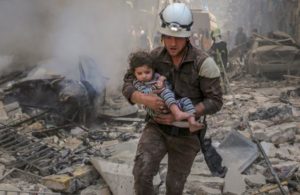‘White Hats’ rescued though international cooperation
 They became famous around the world from news reports showing them pulling victims of airstrikes from the collapsed buildings and rubble-strewn streets of warn-torn Syria.
They became famous around the world from news reports showing them pulling victims of airstrikes from the collapsed buildings and rubble-strewn streets of warn-torn Syria.
Now the ‘White Hats’ – a humanitarian group that operated in the anti-government held areas of Syria have been rescued themselves.
Recently, more than 400 members of the groups, along with their families, where evacuated from the path of advancing Syrian government forces in an operation that required close cooperation among multiple agencies.
What made the evacuation extraordinary was that it was the result of a joint effort by several countries in agreeing to share protection for the group.
The UK, Germany and Canada promised to resettle the fleeing White Hats and their families, while Israel facilitated the escape by allowing the group to pass through areas it controls and Jordan agreed to host them until they are resettled.
The Syrian-Russian military offensive launched in June has resulted in a rapid and fast-growing displacement crisis with more than 300,000 fleeing in the direction of Jordan and the Israeli-occupied Golan Heights.
The White Hats have been accused of being terrorists by the Syrian Government and the Russians which would almost certainly mean a death sentence for any of the group who were captured.
Terrorism laws in Syria allow the government to detain, torture and execute anyone perceived as an opponent without due process of law.
The evacuation comes in the face of both Jordan and Israel refusing to accept Syrian asylum seekers.
Turkey, also, has pushed asylum seekers back from its borders and the EU and US have scaled back Syrian refugee resettlement.
Today, there are about 140,000 Syrians stranded near the Golan Heights, living in dire circumstances without any infrastructure. They fear retaliation by the Syrian government and so far only one in the international community has offered them protection.
There are already 50,000-plus Syrians already stuck along the harsh desert no-man’s-land on the Syria-Jordan border known as the “berm”.
They are sheltering in an informal camp near Rukban, 250 kilometres north-east of Daraa city, because they were refused entry to Jordan as refugees.
Laurie Nowell
AMES Australia Senior Journalist












